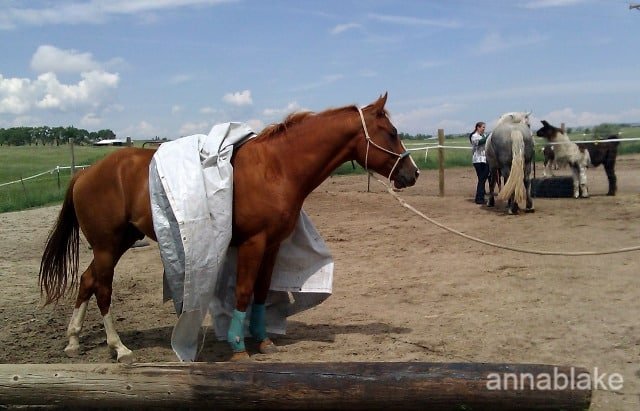I’ve let loose a few decent rants about groundwork lately. I should apologize about the goose-shrill tone in my voice, but I’m not sorry for the sentiment. Groundwork is so crucial to good horsemanship and too many of us tolerate bad ground manners, in our horses and in ourselves.
It’s our fault. We’re always busy, always late, always distracted. We have a slam-bam-thank-you-‘Mam approach: Grab them, toss the halter on, pull them out of their pen and a couple of brush strokes under the saddle and up we go. The more time in the saddle, the better, right? Or we just stroll in a daze, thinking about everything but our horse, being vague and having a passive-aggressive fights. We make the same correction again and again, until we give up. In both cases, we aren’t really connected with our horse, aren’t in the moment with them.

The horses are looking around for their herd, or mugging their human for a treat, or jerking the rope out of the human’s hands to graze. Sometimes they act overly confident, showing loud bravado, and sometimes they are timid, nervous of anything they see. The diagnosis of both behaviors is the same, they have little confidence. They are not misbehaving, so much as asking for help.
The more the horse fidgets, the more the human fidgets back (or vice versa, it doesn’t matter who starts it), until the frustration blows up. From the horse side, it’s probably worth a jerk on the rope for a bite of fresh grass. Then after a few bites of grass, and a few jerks on the lead, there’s a pattern of nagging correction, and he feels the tension rise, and isn’t sure why, until his human gets mad. Even then he isn’t sure what he did wrong, no wonder he loses confidence.
Soon he’s that horse who makes vet’s and farrier’s jobs so much more difficult and dangerous. It opens the door for bruised toes, and then we can’t trust the horse with kids. Should you carry a whip always? Adversity is not a happy place for either of you, and if you start nagging and bickering before you even mount up, there is no reason to hope your horse will start being responsive under saddle. This was never the dream, was it?
If your horse could talk, he would yell, ” Stop pulling on my face and just tell me what you want!” The problem is not sweet grass, it’s the partnership. It’s easy to get so goal oriented that we lose the present moment, we create more fight and less response. Constant correction shuts a horse down, but most of all, it kills the fun, for both of you.
Less Correction, More Direction. Respect your horse’s intelligence and ask clearly and consistently for his attention. Give him a clear cue, expect a respectful response, then let him know he was right with a generous, happy reward. Break the routine nagging by changing to happy conversation, let him depend on your consistent awareness. Take the time you need, so the horse can feel the comfort of partnership, and the confidence of doing something right. Let your leadership help him feel safe. He will return that favor when you need it the most.
Groundwork starts when we catch them. Walk in and exhale. Step one, in every encounter, in the pasture or in a stall, is to ask for their eye. If they don’t want to look at you, then you have some work to do. Take your time before you put the halter on, have a scratch and ask permission. Let them catch you. Let the very first moment be partnership.
This summer we have had monthly Horse Agility here at Infinity Farm. It has been such a gift to my heart to watch the progress of the horses and their humans. Positive conversation is valued above actual achievement. It isn’t about doing the obstacle, so much as the happy ask and answer between partners. We do the asking, the horses have time to understand and answer, and the doing of the obstacle happens almost as an afterthought, because the real reward is finding a peaceful language. In the end (photo above), smart young geldings offer more than expected, and rescue draft mares get llama kisses for being curious and calm. Most important, fun opens the door to partnership and respect. Sweet lessons are the very best.
Anna Blake, Infinity Farm.
Great post! Having a yearling reminds me how important ground manners are, they truly are the building block for under saddle work. It’s amazing how positive ground work can build a great relationship with your horse and how gaining respect on the ground can transfer to respect under saddle.
I agree, I dont think there is a difference for horses, mounted or on the ground, communication and partnership are the important thing. Glad to hear things are going well for you and your filly.
like.. like… like…
Thanks for reminding us of the importance of time spent teaching our horses ground skills. It’s no coincidence that the Spanish Riding School in Vienna teaches every skill to their Lipizzaners on the ground first before ever asking for that skill under saddle.
Changing my thinking from “working my horse” to “playing with my horse” made such a difference. Also reminding myself that this is an emotional, thinking, feeling being and not a motor bike sets our relationship on the path for a 51%–49% partnership.
:Yes, so much easier and happier for both partners to be on the happy side of training.
Thanks, Anna! What a great article!
Thanks for reading…